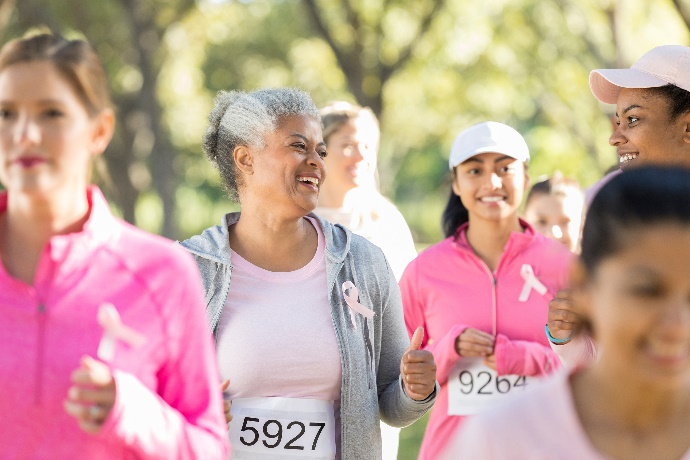
When it comes to health, knowledge surely is power! So, it is fitting that this year’s theme for the Jean Hailes Women’s Health Week is ‘Grow your knowledge’. It’s all about supporting women to make informed decisions about their health, providing information that is easy to access and understand.
Given the essential and varied roles women undertake in their day-to-day lives, often sacrificing their own needs in the process, the spotlight on women’s mental and physical health is incredibly important. This is backed by the Jean Hailes National Women’s Health Survey (2022) which attracted over 14,000 respondents and found that over 1 in 5 women said their mental health stopped them from taking part in daily activities.
BUSY Health understands the increasing demands for women in today’s world so to help you ’Grow Your Knowledge’, we’ve provided ten tips to build a healthier future.
Ten Tips for Women to Build a Healthier Future
1.Check on your general health.
Positive mental health does not just happen in isolation, however it can be closely linked to our physical health. Research points to confirmed links between physical and mental health with exercise, sleep, and diet being the key factors. An inbalance of these can result in dysregulated stress hormones which can then suppress our immune systems. Looking after your physical health can have a big impact on your mental health, which in turn aids your general health. Which brings us to our next tips!
2. Exercise your body.
Some Australian studies have revealed about 39 per cent of women aren’t active enough and more than 12 per cent are completely sedentary. Regular moderate-intensity exercise can boost estrogen levels whilst also helping increase dopamine and serotonin levels, both critical for positive mood and mental health.

3. Get enough sleep.
While sleeping, our brain consolidates memories and gets rid of memories that we won’t need. It allows space for new information we need to consume and use. This consolidation process happens when we hit the REM and Slow Wave Sleep stages, typically toward the end of our night’s sleep, highlighting the importance of an appropriate quality and quantity of sleep.
4. Get your nutrition right.
More and more is becoming known in recent years about the enteric nervous system (ENS), our gut’s “brain”. Researchers are finding evidence that irritation in the gastrointestinal system may send signals to the central nervous system (CNS) that trigger mood changes. Are you feeding your “second brain” what it needs?
5. Get in touch with nature.
As humans, we are of course part of nature, however there is overwhelming evidence that stress (cortisol levels) decrease when we are exposed to a natural environment. Numerous studies have shown salivary cortisol levels decreased after mild to moderate exercise in a natural environment compared with an urban environment. Gentle walking in nature or a swim in the ocean are simple, easy strategies to reduce stress levels.
6. Practice mindfulness
Mindfulness is the act of being in the present moment without judgement. We can practice mindfulness when we are in the shower, eating, washing dishes – and the list goes on. It’s portable! Learning to bring your mind into the present moment can help you draw awareness to your own ability to influence and control things in the here and now, rather than being stuck in matters in the deep past or hypothetical future (which are not as easy to control!). There are plenty of mindfulness apps you can download too to help you get started.
7. Develop self-compassion.
For many women, it can be a challenge to be kind to yourself and develop self-compassion. We all have a critical voice. A good tip in confronting your critical inner voice is to make your first question: “Would I say that to a friend?” If not, why would you say it to yourself? Just as verbally beating up on someone else is unlikely to help their mental health, beating up on yourself is unlikely to help yours either.
8. Get socially connected.
Social connections are also important for our wellbeing, in fact some of the longest living humans on the planet are part of societies that have strongly connected social structures. You can start building connectedness and end feelings of isolation with the smallest of interactions, even if just for a few minutes chatting with the checkout operator or talking to the petrol station assistant. Connection plays a major role in our mental health, telling us we’re not on our own and that we are part of a community of people who are there to support each other.
9. Practice gratitude
The American Psychological Association defines gratitude as a sense of happiness and thankfulness in response to a fortunate happenstance or tangible gift. An easy way to get started on gratitude is to simply stop and think “What are three things you are grateful for today?”

10. Good relationships with your thoughts.
We tend to believe in all our thoughts, but sometimes our thoughts are not helpful or based upon reasonable evidence. They’re just plain negative. It’s important for our mental health to understand and recognise when our thoughts are unhelpful, so that we can challenge these thoughts with evidence and then find more helpful ways of thinking.
Find out more about Women’s Health Week and How to nurture good mental wellbeing on the www.jeanhailes.org.au. This year’s program will feature new resources and information on hormones, PCOS, menopause, cervical screening self-collection, heart health, persistent pelvic pain and nutrition.
If you require further support, please reach out to BUSY Health. We provide a range of confidential, psychological and counselling support options to suit busy women.
Article contributed by Alyne Tavares. Alyne is a Counsellor with BUSY Health.

When it comes to health, knowledge surely is power! So, it is fitting that this year’s theme for the Jean Hailes Women’s Health Week is ‘Grow your knowledge’. It’s all about supporting women to make informed decisions about their health, providing information that is easy to access and understand.
Given the essential and varied roles women undertake in their day-to-day lives, often sacrificing their own needs in the process, the spotlight on women’s mental and physical health is incredibly important. This is backed by the Jean Hailes National Women’s Health Survey (2022) which attracted over 14,000 respondents and found that over 1 in 5 women said their mental health stopped them from taking part in daily activities.
BUSY Health understands the increasing demands for women in today’s world so to help you ’Grow Your Knowledge’, we’ve provided ten tips to build a healthier future.
Ten Tips for Women to Build a Healthier Future
1.Check on your general health.
Positive mental health does not just happen in isolation, however it can be closely linked to our physical health. Research points to confirmed links between physical and mental health with exercise, sleep, and diet being the key factors. An inbalance of these can result in dysregulated stress hormones which can then suppress our immune systems. Looking after your physical health can have a big impact on your mental health, which in turn aids your general health. Which brings us to our next tips!
2. Exercise your body.
Some Australian studies have revealed about 39 per cent of women aren’t active enough and more than 12 per cent are completely sedentary. Regular moderate-intensity exercise can boost estrogen levels whilst also helping increase dopamine and serotonin levels, both critical for positive mood and mental health.

3. Get enough sleep.
While sleeping, our brain consolidates memories and gets rid of memories that we won’t need. It allows space for new information we need to consume and use. This consolidation process happens when we hit the REM and Slow Wave Sleep stages, typically toward the end of our night’s sleep, highlighting the importance of an appropriate quality and quantity of sleep.
4. Get your nutrition right.
More and more is becoming known in recent years about the enteric nervous system (ENS), our gut’s “brain”. Researchers are finding evidence that irritation in the gastrointestinal system may send signals to the central nervous system (CNS) that trigger mood changes. Are you feeding your “second brain” what it needs?
5. Get in touch with nature.
As humans, we are of course part of nature, however there is overwhelming evidence that stress (cortisol levels) decrease when we are exposed to a natural environment. Numerous studies have shown salivary cortisol levels decreased after mild to moderate exercise in a natural environment compared with an urban environment. Gentle walking in nature or a swim in the ocean are simple, easy strategies to reduce stress levels.
6. Practice mindfulness
Mindfulness is the act of being in the present moment without judgement. We can practice mindfulness when we are in the shower, eating, washing dishes – and the list goes on. It’s portable! Learning to bring your mind into the present moment can help you draw awareness to your own ability to influence and control things in the here and now, rather than being stuck in matters in the deep past or hypothetical future (which are not as easy to control!). There are plenty of mindfulness apps you can download too to help you get started.
7. Develop self-compassion.
For many women, it can be a challenge to be kind to yourself and develop self-compassion. We all have a critical voice. A good tip in confronting your critical inner voice is to make your first question: “Would I say that to a friend?” If not, why would you say it to yourself? Just as verbally beating up on someone else is unlikely to help their mental health, beating up on yourself is unlikely to help yours either.
8. Get socially connected.
Social connections are also important for our wellbeing, in fact some of the longest living humans on the planet are part of societies that have strongly connected social structures. You can start building connectedness and end feelings of isolation with the smallest of interactions, even if just for a few minutes chatting with the checkout operator or talking to the petrol station assistant. Connection plays a major role in our mental health, telling us we’re not on our own and that we are part of a community of people who are there to support each other.
9. Practice gratitude
The American Psychological Association defines gratitude as a sense of happiness and thankfulness in response to a fortunate happenstance or tangible gift. An easy way to get started on gratitude is to simply stop and think “What are three things you are grateful for today?”

10. Good relationships with your thoughts.
We tend to believe in all our thoughts, but sometimes our thoughts are not helpful or based upon reasonable evidence. They’re just plain negative. It’s important for our mental health to understand and recognise when our thoughts are unhelpful, so that we can challenge these thoughts with evidence and then find more helpful ways of thinking.
Find out more about Women’s Health Week and How to nurture good mental wellbeing on the www.jeanhailes.org.au. This year’s program will feature new resources and information on hormones, PCOS, menopause, cervical screening self-collection, heart health, persistent pelvic pain and nutrition.
If you require further support, please reach out to BUSY Health. We provide a range of confidential, psychological and counselling support options to suit busy women.
Article contributed by Alyne Tavares. Alyne is a Counsellor with BUSY Health.